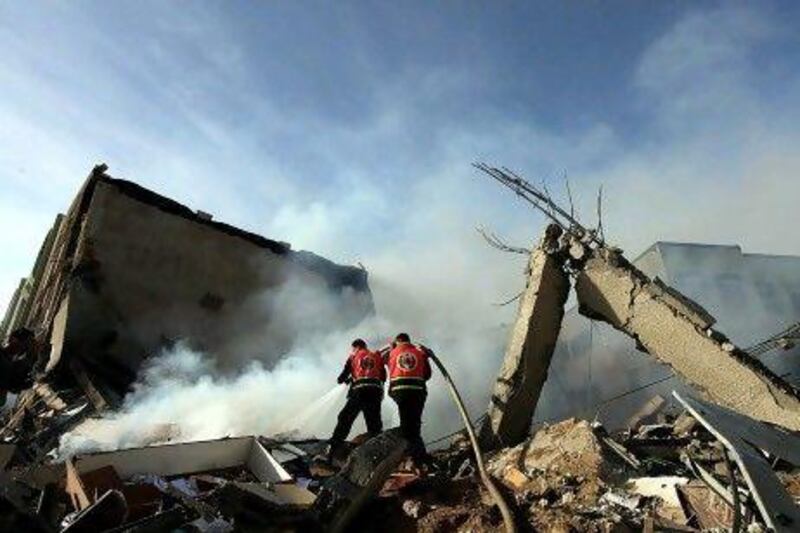GAZA CITY // Hamas militants in Gaza yesterday fired rockets at Jerusalem for the first time, as Israel continued its major air attacks on the territory.
And the Israeli city of Tel Aviv again came under fire as the crisis escalated after the assassination of the Hamas military chief Ahmed Al Jabari on Wednesday.
The Israeli military sealed off the main roads around the Gaza Strip in a sign that Benjamin Netanyahu's government was readying for a ground offensive.
Reports said the government wanted ministerial approval to recruit up to 75,000 reserve soldiers, after earlier activating 16,000 reservists.
A Hamas medical spokesman said on Friday night that the latest Israeli strikes on Gaza had killed five people, taking the death toll since Al Jabari was killed to 29 - 12 militants and 17 civilians, eight of whom were children.
No casualties were reported in Tel Aviv but the rocket crashed into the sea just 200 metres from the US Embassy.
In Jerusalem, air-raid sirens wailed as night fell and the Israeli army confirmed that a rocket fired from Gaza had struck "an open area outside of Jerusalem". It was the first time a Palestinian rocket had ever hit so close to the holy city.
The UAE yesterday condemned Israeli aggression in Gaza, saying the international community has a responsibility towards the Palestinian people.
At a meeting of the Organisation of Islamic Cooperation in Djibouti, Assistant Foreign Minister for International Organisations Affairs, Dr Saeed Mohammed Al Shamsi, reiterated the UAE's support for an independent Palestinian state.
The Palestinian Authority president Mahmoud Abbas struck a defiant tone by saying Palestine's bid to seek upgraded membership at the UN this month would not be derailed by the military campaign.
"No one can stop us," he said.
Egypt also took a hard-line approach, with president Mohammed Morsi calling the Israeli assault a "blatant aggression against humanity".
Egypt's premier, Hisham Qandil, yesterday visited Gaza to express solidarity with its residents and their Islamist rulers.
"What I saw today in Gaza at the hospital, with the martyrs, cannot be met with silence and the whole world should take responsibility to stop the aggression," he said.
The rocket strike on Jerusalem came just hours after another fired from Gaza crashed into the sea off central Tel Aviv, bringing panic to beachgoers in Israel's commercial centre.
"The Qassam Brigades bombed occupied Jerusalem with an M75 Qassam rocket," the Ezzedine Al Qassam Brigades said. Media reports said militants had fired an Iranian-made Fajr-5 rocket at Tel Aviv. It has a range of 75 kilometres, far greater than that of the home-made Qassam rockets, but neither are very accurate, experts say.
Jerusalem lies about 70km from the Gaza Strip. Tel Aviv-Jaffa is about 65km away. On Thursday, the army said another rocket struck Rishon LeTzion, Israel's fourth-largest city, which lies 50km north of Gaza.
Meanwhile, Iraq has denied reports that it has called for the use of oil as a weapon to pressure the US and other countries to stop the Israeli attacks, a government spokesman said yesterday. "The Iraqi government hasn't called for using the oil as a weapon," Ali Al Dabbagh said. "Iraq won't use oil in politics any more."
An Israeli spokesman said 50 rockets were fired at Israel during Mr Qandil's visit, despite an informal truce offered by Mr Netanyahu.
Taher Nunu, a spokesman for Gaza's Hamas government, rejected suggestions the Islamist group would have considered a truce without a complete halt to Israeli attacks.
"We aren't speaking of any ceasefire here," Mr Nunu said. "We are under attack and it is our responsibility to stop the aggression against our people."
Israel, he added, held sole responsibility for triggering the escalation with the assassination of Al Jabari.
The UN secretary general Ban Ki-moon urged Hamas to end its rocket attacks on Israel and asked Israeli leaders to exercise restraint. Mr Ban's spokesman, Martin Nesirky, said the secretary general was "extremely concerned about the continued violence in Gaza and Israel".
Mr Ban is expected to visit Palestine "in two or three days", Mr Abbas says.
Gaza residents such as Ramadan Abu Warda, 45, decried the violence.
"Who in their right mind wants a war like this?" asked Mr Abu Warda as he sat in a stairwell in Shifa hospital waiting for news of his son.
Mahmoud, 12, was in surgery after being injured in an air raid in an area near the Jabalia refugee camp in northern Gaza. Mr Abu Warda's nephew was killed in that attack.
"I don't agree with this shooting and attacking. The people never benefit from it," he said
Residents were preparing for the worst. Vehicles queued at petrol stations in Gaza City. Some received warning text messages from Israel's military saying the offensive's next "stage is coming, stay away from Hamas operatives".
Imams gave fiery sermons during Friday prayers, including at the Al Amin Mosque in Gaza City where calls were issued to "cut the necks" of Israelis.
"If there is a war, there is a war. All we have are rockets to defend ourselves from the Israelis," said Humeid Abu Humeid, 56, a photographer living in Gaza City.
* With additional reporting by Wam and Agence France-Presse





